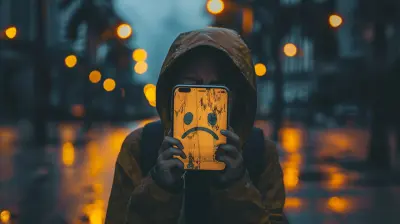Creating a Safe Emotional Space in Friendships
22 September 2025
Friendship is one of life’s most beautiful connections. Think about your best friend for a moment. The one you call when life feels heavy or when there's a story you can’t wait to share. That deep sense of emotional safety—where you know you won't be judged, dismissed, or misunderstood—is the heartbeat of a healthy friendship.
But how do we actually build that kind of trust? How do we create a safe emotional space in friendships that stand the test of time, mishaps, and growth? That’s exactly what we’re diving into today.

Why Emotional Safety Matters in Friendships
You wouldn’t open up in a thunderstorm without shelter, right? Emotions work the same way. Before we can be vulnerable, we need to feel safe—psychologically and emotionally. Emotional safety is the green light that tells us, “Hey, it's okay to be real here.”In friendships, emotional safety means being able to:
- Share your feelings without fear of ridicule
- Be your authentic self without the need to perform or pretend
- Express pain, joy, confusion, and everything in between and feel heard
Without that safety net, even the closest friendships can become surface-level. And nobody wants a friendship that feels like small talk frozen in time.

Signs of an Emotionally Safe Friendship
Before building emotional safety, it helps to recognize what it actually looks like. Here are a few telltale signs you’re in the comfort zone:- You’re not walking on eggshells: You know that a disagreement won’t turn into a blow-up or the end of the friendship.
- You can show vulnerability: Whether you’re sobbing about a breakup or squealing over a silly win, you don’t hold back.
- Mistakes are forgiven: Messed up? A safe friendship allows space for apologies, growth, and mutual compassion.
- There’s no emotional scoreboard: You don’t tally who called last or who texted first; the energy feels balanced.
- You feel recharged, not drained: After hanging out or chatting, you feel uplifted—like you just had a warm bowl of soup for the soul.
If this sounds like the kind of friendship you want or already have, keep reading. Because the magic doesn't happen by accident; it’s created intentionally.

How to Create a Safe Emotional Space in Friendships
Now, let’s get into the good stuff. Creating emotional safety isn’t a one-time act—it’s an ongoing journey of showing up for each other. Here’s how to start cultivating that space:1. Be A Good Listener (Like, Really Listen)
Listening is the foundation of any emotionally safe relationship. And no, we’re not talking about half-listening while checking your phone.Deep, active listening means:
- Maintaining eye contact (or giving verbal cues when texting or on the phone)
- Not interrupting or jumping in with advice unless invited
- Focusing on what they feel, not how you relate to it
Try this: Next time your friend opens up, reflect back what they say. “It sounds like you felt alone when that happened.” It’s simple but powerful. They’ll feel seen—and that’s the goal.
2. Validate Their Emotions (Even If You Don’t Get It)
You don’t have to fully understand someone’s experience to respect it. Emotional validation is like giving a thumbs-up to their inner world, saying, “It’s okay that you feel that way.”A few examples:
- “That sounds incredibly frustrating.”
- “Anyone would feel overwhelmed in your shoes.”
- “I get that this matters a lot to you.”
It’s not about fixing the problem; it’s about affirming the feeling. And sometimes, just that is enough to make someone feel safe and accepted.
3. Be Mindful of Judgment
Let’s be honest—judgment creeps in more than we’d like to admit. But nothing kills emotional safety faster than a backhanded comment or an eye-roll when someone shares something vulnerable.We all have different lives, experiences, and emotional triggers. The goal? Create a no-judgment zone where your friend knows they can be honest without worrying about side-eyes or gossip.
If your opinion isn't constructive or kind, ask yourself: Is this comment helpful, or is it hurtful? If it’s the latter, let it go.
4. Respect Boundaries Like a Pro
We love our friends, and sometimes that love makes us overstep without meaning to. But real emotional safety comes when boundaries are honored.Here’s what that looks like:
- If a friend says they need space, give it—with love.
- If they set a time limit on a tough conversation, honor it.
- If they aren’t ready to talk about something, don’t push.
Respecting boundaries shows your friend that their comfort matters to you just as much as your closeness does. And ironically, that respect brings you even closer.
5. Be Transparent and Honest
Honesty gets a glow-up when it’s paired with kindness. A safe space thrives on transparency—where friends say what they mean, share their feelings openly, and don’t sugarcoat tough truths just to avoid conflict.That said, honesty doesn’t mean being blunt to the point of cruelty. Be gentle. Think of it like offering a truth sandwich: honesty wrapped in compassion with a side of empathy.
Like: “I love you so much, and I’ve been feeling a bit distant lately. Can we talk about it?”
Boom. Open, safe, and respectful.
6. Apologize When Needed (And Mean It)
We all mess up. Maybe you forgot to call. Maybe you snapped when you were stressed. The key to keeping the emotional space intact is owning up to it.A genuine apology sounds like this:
> “I realize what I said hurt you, and I’m really sorry. That wasn’t my intention, but I understand your feelings. I’ll do better.”
No excuses. No passive-aggressiveness. Just honest accountability.
Apologizing strengthens trust. It tells your friend, “You matter to me more than my ego does.”
7. Create Rituals of Care
You don’t always need deep talks to build emotional safety. Sometimes, it’s the little acts of care that say, “I’ve got your back.”Try this:
- Leave a funny voice note when they’re having a bad day
- Send a silly meme just because
- Celebrate their wins—big or small
Friendship is made up of thousands of micro-moments. When those moments consistently say “You’re safe here,” the bond becomes stronger than ever.
8. Encourage Vulnerability—Start With You
Want your friend to open up more? Model vulnerability yourself. Share how you’re feeling, even if it’s messy or uncertain. It’s the emotional equivalent of saying, “I’ll go first.”When you break the wall, you give your friend permission to do the same. It’s like a trust fall—one person has to lean back first.
Start with:
- “I’ve been feeling a little insecure about…”
- “I really missed you lately, and I didn’t know how to say it.”
- “This might sound weird, but I needed to talk to someone.”
You’d be surprised how much openness deepens a friendship.
When Emotional Safety Gets Complicated
Let’s be real. Not every friendship starts on an emotionally safe foundation. You might be dealing with a friend who shuts down, lashes out, or retreats when emotions come up.A few tips for navigating those trickier waters:
- Speak from your experience: Use “I” language. Say, “I feel hurt when I’m interrupted” instead of “You always interrupt me.”
- Talk during calm moments: Don’t bring it up mid-conflict. Wait for a chill moment to connect.
- Be okay with outgrowing some connections: Not every friendship is meant for deep emotional space. And that’s okay, too.
The goal isn’t perfection—it’s progress.
Keeping the Emotional Space Alive
Like a cozy campfire, emotional safety has to be tended to. That means:- Checking in regularly
- Being curious about what your friend is going through
- Holding space without needing to “solve” everything
Also, don’t forget to appreciate each other aloud. A simple “Thank you for always listening to me” can work wonders.
Friendships are living, breathing relationships. They grow when nurtured.
Final Thoughts
Creating a safe emotional space in friendships doesn’t require grand gestures or dramatic conversations. More often, it's in the small, intentional ways we show up, listen, respect, and care.It’s choosing compassion over correction. It’s leaning in when it’s hard. It’s saying, “You’re safe with me,” not just with words—but with actions, time and time again.
So, the next time a friend opens up, know that you have the power to make that moment feel like home. Emotionally. Honestly. Entirely.
Because at the end of the day, isn’t that what we all want? A soft place to land.
all images in this post were generated using AI tools
Category:
Emotional SupportAuthor:

Jenna Richardson
Discussion
rate this article
1 comments
Kaleb Harris
Establishing a safe emotional space is essential; vulnerability fosters deeper connections and mutual understanding.
September 28, 2025 at 3:57 PM

Jenna Richardson
Absolutely! Vulnerability is key to building trust and intimacy in friendships, allowing for genuine connections and support.


